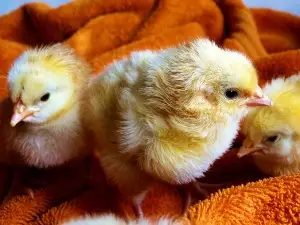
Feathers are very important to chickens, feathers act as a protective covering for these birds, without feathers, chickens wouldn’t be protected from the sun, rain, cold, and wouldn’t be protected from injury.
It’s clear that without feathers, chickens, and growing chicks, would suffer. This article looks into why your baby chick is not growing feathers.
Table of Contents
Baby chick not growing feathers:
A baby bird should ideally start growing feathers at around 7 days old. If your newly hatched chicks grow older than 7 days old, and have still not grown feathers then this may be the reason:
Delayed feathering:
Some chicks will have faster than normal feather development and some chicks will have slower than normal feather development. If your chicks aren’t growing feathers by their 7th day of life, then the bird may have slow feather development.
Slow feathering is usually caused by a few autosomal genes and a sex-linked gene.
If your bird is of the Barred Plymouth Rock, Brahma, Cornish, Cochin, Rhode Island Red, Wyandotte, Plymouth Rock, or Orpington breed then your bird will likely be a slow feathering bird.
If your bird is extremely slow feathering then the bird will have no feathers into its juvenile life and into its adult life as well.
What to do:
If your bird is a slow-feathering breed of bird then there is nothing you can do about the bird’s slow-growing feathers. Slow feathering is normal for these breeds of bird and is nothing to worry about.
A lack of feathers may be normal for your bird but this lack of feathers means that the bird will be more sensitive to the cold. You’d need to take extra steps to keep the bird warm, especially during the wintertime.
Keep the featherless chick warm by placing it under a heat lamp. The best lamp to use would be a lamp that emits 250-watt infrared heat, this will keep the bird warm and toasty.
Avoid using ordinary hot-water radiators, electric heat pads, and incandescent bulbs, to keep the birds warm.
These should be avoided because they do not get to the optimum temperature needed to keep chicks warm, and, are not reliable heat sources, these items can also overheat your chicks.
Tip: Using a red light, or another tinted colored light, is recommended. Colored lights are less stressful to baby birds when compared to white light.
Diet issues:
Feeding chicks can be tricky and giving chicks all the vitamins and minerals that they need can be difficult.
If the bird isn’t being fed correctly, or if the bird is getting fed mostly scratch and other treats, then the bird can become malnourished, a malnourished chick’s feathers will not grow well.
Good nutrition is needed for a chick to grow well, and, to its highest potential. Proteins are the building block of muscles, they are needed for healthy chick growth and healthy feather growth.
What to do:
Take a closer look at what your chick is eating. Baby birds should be fed a chick starter feed that contains at least 18 percent protein, this diet promotes adequate body and feather growth.
Also, make sure that you choose a feed that contains probiotics, prebiotics, amino acids, and yeast for immune health, as well as vitamins and minerals which are needed for good bone health.
Placing your chicks under heat lamps, to keep them warm while their feathers grow in, is also recommended.
Pecking:
If one bird is smaller and weaker than the other birds then the larger birds may be pecking at the smaller birds’ feathers, this will make the bird look like it isn’t growing feathers.
Your birds can start to peck at each other because they are under high amounts of stress, because of overcrowding, because they are sick, or because of boredom.
What to do:
You’d need to isolate the pecked bird to see if pecking is the reason for the lack of feathers, or if it is because of something else. Isolate the bird and wait to see if the bird’s feathers grow back.
If this is the reason why your bird has a lack of feathers then you’d need to either give the pecking birds something else to entertain themselves with if they are bored, give them more space to roam if they are overcrowded, find out if they are sick and treat them if they are sick, or, take away any stressors and give them the opportunity to calm down.
If you enjoyed this article then you may also be interested in other chicken related articles. Here are some articles that you may be interested in: Newly Hatched Chick Bleeding, Shrink Wrapped Chick, Baby Chick Swollen Abdomen, Sticky Chick, Chick Hatching With A Dry Membrane

